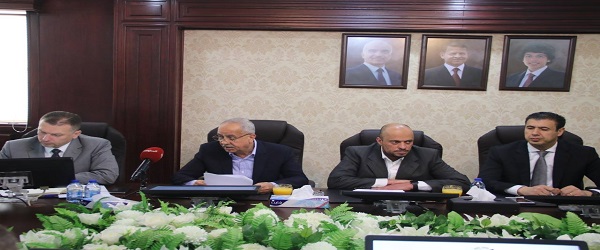25-Apr-2019

Statistical
data for the Jordan Chamber of Industry revealed that the products of the
construction sector cover 53 percent of domestic consumption and the rest is
done by imports.
The sector's representative in the Chamber of Industry, Alaa
Abu Sufa, said at a press conference on Wednesday that the construction sector
accounts for 16 percent of the total industrial establishments with 2,813
establishments and a registered capital of 315 million dinars, representing 70
percent of the total registered capital in the industry.
The head of the Jordan Chamber of Industry, Eng. Fathi
al-Jaghbir, said that the exports of the sector, most of which go to Arab
countries, increased last year by 14 percent to reach 138 million dinars,
compared with 121 million dinars in 2017.
The sector accounts for 3.3 percent of gross domestic product
and 3 percent of total industrial exports, while paying about 150 million
dinars a year as taxes on production. It also accounts for 13 percent of the
total production of the industry and employs 18,000 workers.
He said: "The exports of the construction industry has
untapped opportunities estimated at more than $ 100 million in several products
to different countries of the world, with the same volume of operations and
investment, but it needs to open new export markets.
He pointed out that the most prominent sectors are the iron
industry, which employs 150 establishments with a capital of 150 million dinars
and provided 6 thousand jobs followed by cement and gypsum industry, which operates
40 establishments with a capital of 120 million dinars, employing 2000 workers.
He pointed to the challenges facing the sector, including the
high cost of production, as the cost of energy about 40 percent of the total
cost of production requirements and unfair competition from imports, especially
Arab, in addition to the lack of conformity of some imported products to
Jordanian standards and standards, and the absence of standard specifications
for all products Leads to unfair competition and constant change in
construction regulations and laws.
He called on Abu Sufa to provide energy sources for owners of
factories and factories for the construction industries at subsidized prices
and appropriate as in neighbouring countries and give the local industry of the
construction sector a price preference of 30 percent instead of 15 currently,
especially large projects.
He stressed the promotion of investment opportunities
available in the construction sector, especially reconstruction projects and support
exports and products of the sector and the opening of new export markets and
participation in international exhibitions to introduce the products of
national industry.
Al-Jaghbair pointed out that the construction sector achieved
remarkable results over the past years despite all the challenges facing the
Jordanian economy and the economic sectors in general due to the regional
unrest and the decline in economic growth rates in the Kingdom.
He called for studying the production costs borne by the industrial
sector, which is now a burden on industrialists, especially with regard to
canceling the item of fuel price difference from the electricity bill,
explaining that this will be support and incentive for industry to increase
investments and exports and provide more job opportunities.
×
![]()